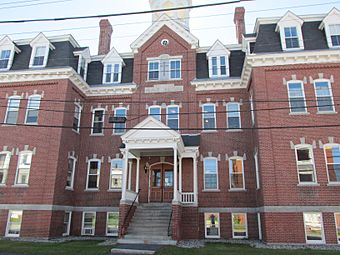Healy Asylum facts for kids
Quick facts for kids |
|
|
Healy Asylum
|
|

Healy Asylum
|
|
| Location | 81 Ash Street, Lewiston, Maine |
|---|---|
| Area | less than one acre |
| Built | 1893 |
| Architect | Jefferson Lake Coburn |
| Architectural style | Second Empire |
| NRHP reference No. | 79000128 |
| Added to NRHP | October 1, 1979 |
The Healy Asylum is a historic building in Lewiston, Maine. It was built in 1893 to be an orphanage for boys, and it served that purpose until around 1970. Today, it is known as Healy Terrace and provides affordable homes for senior citizens. This important building was added to the National Register of Historic Places in 1979. It was named after Msgr. James Augustine Healy, who was a leader in the Roman Catholic Diocese of Portland when the building was constructed.
What the Building Looks Like
The former Healy Asylum building is located on Ash Street in Lewiston. It takes up about half of a city block. The building is three and a half stories tall. It is made of brick with stone decorations. The roof is a special type called a mansard roof, which has windows sticking out.
The building has an H-shape, with a middle part and two sections that stick out. The main entrance is in the middle. It has a wooden porch with a fancy roof above it.
The Story of Healy Asylum
The story of this building began in 1878. That's when a group of Grey Nuns came from Saint-Hyacinthe, Quebec. They came to teach in the local schools, which were full of children whose parents worked in the mills.
In 1892, the Grey Nuns decided to stop teaching. Instead, they agreed to open an orphanage for boys. They already had a hospital that cared for orphaned girls. This new building was built in 1893. It had the support of Msgr. James Augustine Healy, the local Catholic leader. The building was named after him. A local architect named Jefferson Louis Coburn designed the building.
Besides caring for orphaned boys, the nuns also helped young people who needed extra support. The facility was open until 1973. After that, it was changed into homes for senior citizens.
 | Kyle Baker |
 | Joseph Yoakum |
 | Laura Wheeler Waring |
 | Henry Ossawa Tanner |



